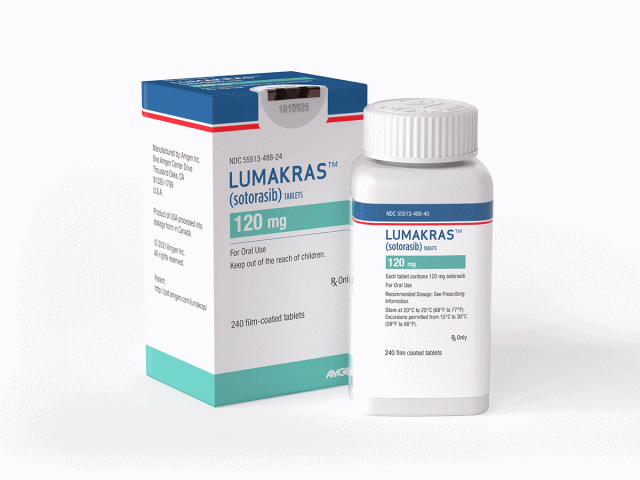Amgen eyes pancreatic cancer use for its pathfinder KRAS drug

Armed with new clinical trial results, Amgen is expanding studies of its KRAS inhibitor Lumakras in pancreatic cancer, as it tries to extend the label for the first-in-class drug beyond its current use in non-small cell lung cancer (NSCLC).
Data from the CodeBreaK 100 phase 1/2 trial showed "encouraging and clinically meaningful anticancer activity" for Lumakras (sotorasib) in patients with KRAS G12C-mutated advanced pancreatic cancer, including an objective response rate (ORR) of 21%, all partial responses.
Treatment was also associated with an 84% disease control rate (DCR) indicating stabilisation of the cancer in the 38-patient study, which enrolled patients who had received multiple prior lines of therapy.
The new results invited immediate comparisons with the KRYSTAL-1 study of Mirati Therapeutics' adagrasib – Amgen's closest rival in the KRAS inhibitor category – which were reported last month.
Mirati's trial enrolled a different patient group, including people with KRAS G12C-positive pancreatic cancer as well as other gastrointestinal tumours, and used a different protocol. That undermines any effort to draw conclusions of the relative merits of the two drugs, which both extended the time to disease progression or death by around six months.
Nevertheless, Mirati will point to a higher top-line ORR at 41%, and a 100% DCR, that could give its drug an edge on efficacy, albeit with what seems to be a slightly worse tolerability profile with a higher rate of grade 3 or higher adverse events.
That said, which KRAS mutations are seen in around 90% of pancreatic cancer patients, only 1% to 2% are KRAS G12C, so both Amgen and Mirati could be chasing a small patient population with the new indication.
Pancreatic cancer is extremely difficult to treat however, with a five-year survival rate of 5% and no drugs that have shown any survival benefit after first- and second-line chemotherapy, so the KRAS drugs could throw a lifeline to at least some patients who have a very poor prognosis.
Lumakras is the first KRAS inhibitor to reach the market, getting approval from the FDA for KRAS G12C-mutated NSCLC last May, after decades of fruitless research into the drug class. Mirati is a little behind, as it has filed for approval of adagrasib for that indication and is expecting a verdict from the FDA before the end of 2022.
Analysts have said that Lumakras could eventually make blockbuster sales of $1 billion or more, assuming Amgen can extend the label for the drug into the first-line NSCLC setting, as well as other KRAS-mutated tumour types.
Last September, Amgen reported encouraging results from the CodeBreaK 101 trial of Lumakras used alongside its EGFR drug Vectibix (panitumumab ) in KRAS G12C-positive colorectal cancer (CRC).
Mirati is nipping at its heels in that indication as well however, as it is testing adagrasib on its own and in combination with another EGFR-targeting antibody – cetuximab – in the CRC indication.
"Based on these exciting data, we are expanding CodeBreaK 100 to enrol more patients with pancreatic and other tumour types to better understand the efficacy and safety of Lumakras in tumours outside of [NSCLC and CRC]," said Amgen's head of R&D David Reese.
Lumakras contributed $90 million to Amgen's revenues last year, half of that in the final quarter of the year, although that was lower than expected by analysts.
Sales are strongest in the US, where around 75% of patients with NSCLC are now being tested by their oncologists at diagnosis for the KRAS G12C mutation.













